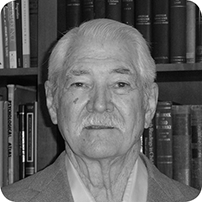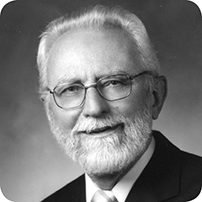|
John B. Watson's "Dozen Infants" Statement: A Balanced Appraisal |
| Tuesday, October 8, 2013 |
| 8:30 AM–9:20 AM |
| Yucatan II (Fiesta Americana) |
| Area: TPC; Domain: Theory |
| Instruction Level: Basic |
| CE Instructor: Hayne W. Reese, Ph.D. |
| Chair: Linda J. Parrott Hayes (University of Nevada, Reno) |
| HAYNE W. REESE (West Virginia University) |
 Hayne W. Reese received his Ph.D. in experimental child psychology at the State University of Iowa (1958), was assistant to full professor at the State University of New York at Buffalo (1958-1967), a professor at the University of Kansas (1967-1970), and centennial professor of psychology at West Virginia University (1970-2000), at which is he now centennial professor emeritus. His professional interests are in life-span development of learning, memory, and problem solving, and philosophical, theoretical, and historical issues. He was a member of several National Institute of Mental Health and National Institutes of Health Initial Review Groups (14 years), and served the Journal of Experimental Child Psychology as a member of the editorial board (1965-1974, 1998-2000), associate editor (1975-1983), and editor (1983-1997). His bibliography includes dozens of authored or edited books, including 26 volumes of Advances in Child Development and Behavior and eight volumes of Life-Span Developmental Psychology, more than a hundred journal articles and chapters, and well over a hundred oral presentations Hayne W. Reese received his Ph.D. in experimental child psychology at the State University of Iowa (1958), was assistant to full professor at the State University of New York at Buffalo (1958-1967), a professor at the University of Kansas (1967-1970), and centennial professor of psychology at West Virginia University (1970-2000), at which is he now centennial professor emeritus. His professional interests are in life-span development of learning, memory, and problem solving, and philosophical, theoretical, and historical issues. He was a member of several National Institute of Mental Health and National Institutes of Health Initial Review Groups (14 years), and served the Journal of Experimental Child Psychology as a member of the editorial board (1965-1974, 1998-2000), associate editor (1975-1983), and editor (1983-1997). His bibliography includes dozens of authored or edited books, including 26 volumes of Advances in Child Development and Behavior and eight volumes of Life-Span Developmental Psychology, more than a hundred journal articles and chapters, and well over a hundred oral presentations |
| Abstract: John B. Watson endorsed his “Dozen Infants” statement, and it is probably his most widely cited fragment. However, it often has been disparaged imprudently because of ignoring its context and other reasons shown by analyses in this paper. A byproduct of the analyses is a summary of the essentials of Watson’s behaviorism. |
| Target Audience: Anyone interested in the essentials of Watson's behaviorism. |
Learning Objectives: At the conclusion of the presenation, participants should be able to:
--Describe what Watson’s “Dozen Infants” statement means based on its content and context.
--Describe the concrete roles attirbuted to heredity and environment in Watson’s “Dozen Infants” statement and his related writings.
--Describe the kinds of evidence relevant to Watson’s views about heredity and environment that are important in contemporary psychology and behavior sciences. |
|
| |
| |
|
Empirical Support for an Operant Theory of Adjunctive Behavior |
| Tuesday, October 8, 2013 |
| 9:30 AM–10:20 AM |
| Yucatan II (Fiesta Americana) |
| Area: EAB; Domain: Experimental Analysis |
| Instruction Level: Basic |
| CE Instructor: Ricardo Pellón, Ph.D. |
| Chair: Javier Nieto Gutierrez (National Automonous University of Mexico) |
| RICARDO PELLÓN (Universidad Nacional de Educacion a Distancia) |
 Ricardo Pellón earned a degree in psychology in 1980 and in 1987 presented his Ph.D. in experimental psychology, both at Universidad Autónoma de Madrid (Spain). He has held research positions at the University of Wales College of Cardiff, United Kingdom (1981-1984) and the Addiction Research Centre of the National Institute on Drug Abuse, Baltimore, MD, (1990-1991). In 2005-2006, he spent a sabbatical at Arizona State University. He is currently a professor of psychology at Universidad Nacional de Educación a Distancia, Madrid, Spain, where he directs an animal behavior lab working predominantly (but not exclusively) on animal models of excessive behavior, such as schedule-induced polydipsia and activity-based anorexia, both using laboratory rats as experimental subjects. He has published in international journals in the areas of learning and behavior, behavioral pharmacology, and neural substrates of behavior. Ricardo Pellón earned a degree in psychology in 1980 and in 1987 presented his Ph.D. in experimental psychology, both at Universidad Autónoma de Madrid (Spain). He has held research positions at the University of Wales College of Cardiff, United Kingdom (1981-1984) and the Addiction Research Centre of the National Institute on Drug Abuse, Baltimore, MD, (1990-1991). In 2005-2006, he spent a sabbatical at Arizona State University. He is currently a professor of psychology at Universidad Nacional de Educación a Distancia, Madrid, Spain, where he directs an animal behavior lab working predominantly (but not exclusively) on animal models of excessive behavior, such as schedule-induced polydipsia and activity-based anorexia, both using laboratory rats as experimental subjects. He has published in international journals in the areas of learning and behavior, behavioral pharmacology, and neural substrates of behavior. |
| Abstract: Killeen and Pellón (2013) have developed a model that is based on the hypothesis that adjunctive behavior is maintained by delayed reinforcement, occurring despite the absence of any programmed contingency between the behavior and the consequence. The best studied example of adjunctive behavior is schedule-induced polydipsia (SIP), and here data are presented that support the idea that SIP can be maintained by reinforcement. In a first study, rats developed high levels of adjunctive drinking by delivering a pellet of food 30 seconds after the completion of 20 licks to a water-bottle spout. The acquisition of adjunctive drinking was greater than in a group that had such positive contingency on only half of the trials, and even greater than in a yoked-control group that received the food pellets irrespective of its own licking. In a second study, by default a single pellet of food was delivered at regular 90-second intervals but the inter-food interval could be shortened depending on the rats' licking. The degree of contingency between licking the bottle spout and hastening the delivery of the food pellet was 100%, 50% and 0% for separate groups, with the development of SIP positively related to those different contingencies. Drinking is decreased if it forestalls reinforcement, enhanced if it hastens reinforcement, and can do so at delay characteristic of those present in studies of SIP. We are currently complementing these studies by testing the idea that water might derive reinforcing properties through its association with food. |
| Target Audience: Anyone interested in adjunctive behavior or delayed reinforcement. |
| Learning Objectives: Forthcoming. |
|
| |
| |
|
Synergy of Repertoires and Metacontingencies: An Account of the Mexican Muralist Movement |
| Tuesday, October 8, 2013 |
| 11:00 AM–11:50 AM |
| Yucatan II (Fiesta Americana) |
| Area: OBM; Domain: Theory |
| Instruction Level: Basic |
| CE Instructor: Maria E. Malott, Ph.D. |
| Chair: Kurt Salzinger (Hofstra University) |
| MARIA E. MALOTT (ABAI) |
 Dr. Maria E. Malott is CEO of the Association for Behavior Analysis International (ABAI), which she has administered since 1993. During this time and within a few short years, ABAI has risen from near-bankruptcy to become a financially stable, growing scientific and professional organization. Her past experience includes serving as vice president of manufacturing at a Midwestern injection molding company and president and founder of Malott and Associates, through which for 14 years she consulted for advertising agencies, restaurants, retail and manufacturing companies, hotels, banks, governmental organizations, and nonprofit institutions. Her clients have included Meijer, Inc.; Kellogg's; Pharmacia & Upjohn; General Motors Corp.; and others. Throughout her career, Dr. Malott has combined the analysis of metacontigencies and behavioral contingencies in managing complex systems and, in the process, has taught dozens of corporate executives to appreciate the power of organizational behavior management technology. Dr. Malott has presented nearly 200 papers, taught 34 workshops, and lectured in 37 universities in 18 countries, and is an affiliated faculty in three universities. She has served on four editorial boards and is the author of the book Paradox of Organizational Change, published in Spanish and English and co-author of Elementary Principles of Behavior. She is a Fellow of ABAI and was the recipient of the 2003 Award for International Dissemination of Behavior Analysis from the Society for the Advancement of Behavior Analysis, the 2004 Award for Outstanding Contributions to Organizational Behavior Management, from the Organizational Behavior Management Network, the 2002 Outstanding Alumni Award from the Department of Psychology at Western Michigan University, and the 2012 Award for Distinguished Service to Behavior Analysis from the Society for the Advancement of Behavior Analysis. Dr. Maria E. Malott is CEO of the Association for Behavior Analysis International (ABAI), which she has administered since 1993. During this time and within a few short years, ABAI has risen from near-bankruptcy to become a financially stable, growing scientific and professional organization. Her past experience includes serving as vice president of manufacturing at a Midwestern injection molding company and president and founder of Malott and Associates, through which for 14 years she consulted for advertising agencies, restaurants, retail and manufacturing companies, hotels, banks, governmental organizations, and nonprofit institutions. Her clients have included Meijer, Inc.; Kellogg's; Pharmacia & Upjohn; General Motors Corp.; and others. Throughout her career, Dr. Malott has combined the analysis of metacontigencies and behavioral contingencies in managing complex systems and, in the process, has taught dozens of corporate executives to appreciate the power of organizational behavior management technology. Dr. Malott has presented nearly 200 papers, taught 34 workshops, and lectured in 37 universities in 18 countries, and is an affiliated faculty in three universities. She has served on four editorial boards and is the author of the book Paradox of Organizational Change, published in Spanish and English and co-author of Elementary Principles of Behavior. She is a Fellow of ABAI and was the recipient of the 2003 Award for International Dissemination of Behavior Analysis from the Society for the Advancement of Behavior Analysis, the 2004 Award for Outstanding Contributions to Organizational Behavior Management, from the Organizational Behavior Management Network, the 2002 Outstanding Alumni Award from the Department of Psychology at Western Michigan University, and the 2012 Award for Distinguished Service to Behavior Analysis from the Society for the Advancement of Behavior Analysis. |
| Abstract: From 1921 to the mid-1950s, the largest muralist movement in art history since the Renaissance developed in Mexico, leaving a remarkable legacy to the country and the world. The movement was controversial from its inception. It centered on an effort to create an egalitarian society; its mission was to reach the masses with expressions of their social, emotional, and political circumstances. Mexican muralists received commissions abroad and their international success brought high demand for frescoes in government and private walls around the country. The Mexican muralist movement can be analyzed as a cultural phenomenon. How did it come to exist? What kept it going and caused it to cease? And why, in spite of international attempts, did it never reach comparable scale or significance elsewhere? I will argue the synergy of interactions from a few individuals with distinctive repertoires and interlocking metacontingencies can account for the movement. And although the specifics of the muralists undertaking were unique and nonreplicable, the properties of other cultural phenomena with substantial impact are of similar nature. |
| Target Audience: Anyone interested in art, culture or metacontingencies. |
| Learning Objectives: At the conclusion of the presentation, participants should be able to:
--Explain how ordinary people can accomplish extraordinary things.
--Describe the role organizations play in cultural change.
--Explain how behavioral systems analysts could account for unique cultural achievements. |
|
| |
| |
|
Where There's the Most Light: Motivation and Behavior Analysis |
| Tuesday, October 8, 2013 |
| 12:00 PM–12:50 PM |
| Yucatan II (Fiesta Americana) |
| Area: TPC; Domain: Theory |
| Instruction Level: Basic |
| CE Instructor: M. Jackson Marr, Ph.D. |
| Chair: Maria Antonia Padilla Vargas (University of Guadalajara) |
| M. JACKSON MARR (Georgia Tech) |
 M. Jackson (Jack) Marr received a BS degree in 1961 from the Georgia Institute of Technology, where he studied mathematics, physics, and psychology. He received a Ph.D. in experimental psychology with a minor in physiology from the University of North Carolina at Chapel Hill in 1966. He is professor emeritus of psychology at Georgia Tech, where he has taught courses in physiology and behavior; behavioral pharmacology; and probability and statistics; and continues to teach the experimental analysis of behavior. He is one of five founding Fellows of the Association for Behavior Analysis International, a Fellow of Division 25 (Behavior Analysis) of the American Psychological Association, a Federation of Associations in Behavioral & Brain Sciences Foundation honoree, past president of the Society for the Advancement of Behavior Analysis, past president of both the Association for Behavior Analysis and Division 25 of APA. He is the past editor of Behavior and Philosophy, and continues to serve as review editor of the Journal of the Experimental Analysis of Behavior, a position he has held since 1998. He also serves as the co-editor of Revista Mexicana de An�lisis de la Conducta. He was an associate editor of the Journal of the Experimental Analysis of Behavior and The Behavior Analyst. He was experimental representative to the Executive Council of the Association for Behavior Analysis, served on the board of directors of the Society for the Quantitative Analysis of Behavior (SQAB), and currently serves on the board of trustees the Cambridge Center for Behavioral Studies. He has been particularly active in the international support and development of behavior analysis in Europe, Mexico, China, and the Middle East. He was a Research Fellow in Pharmacology at Harvard Medical School, a visiting professor at the Universidad National Autonoma de Mexico, and the first Eminent Scholar invited to Jacksonville State University. He was a Navy contractor for Project Sanguine, and an AIEE Senior Fellow at the Naval Aerospace Medical Research Laboratory. For many years, he has been involved through National Science Foundation grants and other support in the assessment and improvement of engineering education, including engineering physics, using methods derived from the applied behavior analysis of skill acquisition and the cognitive science of problem solving. Other current research interests include dynamical systems theory, the quantitative analysis of behavior, comparative behavior analysis, and theoretical/conceptual issues in behavioral analysis. M. Jackson (Jack) Marr received a BS degree in 1961 from the Georgia Institute of Technology, where he studied mathematics, physics, and psychology. He received a Ph.D. in experimental psychology with a minor in physiology from the University of North Carolina at Chapel Hill in 1966. He is professor emeritus of psychology at Georgia Tech, where he has taught courses in physiology and behavior; behavioral pharmacology; and probability and statistics; and continues to teach the experimental analysis of behavior. He is one of five founding Fellows of the Association for Behavior Analysis International, a Fellow of Division 25 (Behavior Analysis) of the American Psychological Association, a Federation of Associations in Behavioral & Brain Sciences Foundation honoree, past president of the Society for the Advancement of Behavior Analysis, past president of both the Association for Behavior Analysis and Division 25 of APA. He is the past editor of Behavior and Philosophy, and continues to serve as review editor of the Journal of the Experimental Analysis of Behavior, a position he has held since 1998. He also serves as the co-editor of Revista Mexicana de An�lisis de la Conducta. He was an associate editor of the Journal of the Experimental Analysis of Behavior and The Behavior Analyst. He was experimental representative to the Executive Council of the Association for Behavior Analysis, served on the board of directors of the Society for the Quantitative Analysis of Behavior (SQAB), and currently serves on the board of trustees the Cambridge Center for Behavioral Studies. He has been particularly active in the international support and development of behavior analysis in Europe, Mexico, China, and the Middle East. He was a Research Fellow in Pharmacology at Harvard Medical School, a visiting professor at the Universidad National Autonoma de Mexico, and the first Eminent Scholar invited to Jacksonville State University. He was a Navy contractor for Project Sanguine, and an AIEE Senior Fellow at the Naval Aerospace Medical Research Laboratory. For many years, he has been involved through National Science Foundation grants and other support in the assessment and improvement of engineering education, including engineering physics, using methods derived from the applied behavior analysis of skill acquisition and the cognitive science of problem solving. Other current research interests include dynamical systems theory, the quantitative analysis of behavior, comparative behavior analysis, and theoretical/conceptual issues in behavioral analysis. |
| Abstract: Behavior analysis is in the dark regarding quite fundamental concepts. For example, "motivation" is a topic many behavior analysts, basic and applied, have mixed feelings about despite what all the literature says on "motivational operations". Dr. Marr will argue that behavior analysts, particularly in their treatment of reinforcement, are guilty of limited vision and in many ways are still tied to traditional motivational concepts-where apparently the light is better. He will provide a definition of motivation (and what it is not) and discuss some of the commonly studied variables said to control probabilities of action. Most behavior is controlled by consequences having little, if any, relation to motivational variables. Dr. Marr will discuss continued naive perspectives on "conditioned reinforcement" and the positive versus negative reinforcement controversy as well as the role of the history of contingencies in establishing the actions of consequences. Dr. Marr believes our field needs to search beyond its current horizons to achieve more enlightenment. |
| Target Audience: Anyone interested in the fundamental concepts of behavior analysis. |
Learning Objectives: At the conclusion of the presentation, participants should be able to:
-- Provide a definition of “motivation,” including what it is NOT.
-- Tie so-called “motivational” operations and their effects to contingencies and their histories.
-- Emphasize that much (if not most) of human behavior has little to do with motivational issues as typically treated by behavior analysts.
|
|
| |
| |
|
Behavioral Approaches to Education and Instruction |
| Tuesday, October 8, 2013 |
| 1:00 PM–1:50 PM |
| Yucatan II (Fiesta Americana) |
| Area: TBA; Domain: Applied Behavior Analysis |
| Instruction Level: Basic |
| CE Instructor: Joseph J. Pear, Ph.D. |
| Chair: Maria Antonia Padilla Vargas (University of Guadalajara) |
| JOSEPH J. PEAR (University of Manitoba) |
 Joseph J. Pear received a B.S. degree from the University of Maryland and M.A. and Ph.D. degrees from The Ohio State University. He is currently a professor of psychology at the University of Manitoba. Pear has done basic and applied research and is a fellow of Division 6 (Behavioral Neuroscience and Comparative Psychology) and Division 25 (Behavior Analysis) of the American Psychological Association. Pear's early basic research was with rats and pigeons. Currently, he is conducting research with fish using a tracking system he developed. His best-known basic research deals with behavioral contrast, shaping, and the spatio-temporal analysis of behavior. In addition, he has done work in the mathematical analysis of behavior. His early applied work focused on children with developmental disabilities at the St. Amant Centre, where he founded the Behaviour Modification Unit, now the Psychology Department. In 2009, he received an award for Outstanding Contribution to Behavior Analysis in Manitoba from the Manitoba Association for Behavior Analysis. Currently, he is the principal investigator on a grant to research Knowledge Transfer with members of the psychology departments at the University of Manitoba and Brock University, and with researchers at St.Amant and the New Haven Learning Centre in Ontario. Pear also developed an instructional and research program called Computer-Aided Personal System of Instruction (CAPSI). CAPSI is used to teach courses at the University of Manitoba and at other universities in Canada, the United States, and Australia. For his work in this area, Pear received two honors: An award for Innovative Excellence in Teaching, Learning, and Technology at the 13th International Conference on Teaching and Learning and the Fred S. Keller Behavioral Education Award for Distinguished Contributions to Education from Division 25 of the American Psychological Association. In addition to co-authoring Behavior Modification: What It Is and How to Do It with Garry Martin, Pear has written two other books: The Science of Learning and A Historical and Contemporary Look at Psychological Systems. He also has written numerous basic and applied research articles, book chapters, and encyclopedia articles. Joseph J. Pear received a B.S. degree from the University of Maryland and M.A. and Ph.D. degrees from The Ohio State University. He is currently a professor of psychology at the University of Manitoba. Pear has done basic and applied research and is a fellow of Division 6 (Behavioral Neuroscience and Comparative Psychology) and Division 25 (Behavior Analysis) of the American Psychological Association. Pear's early basic research was with rats and pigeons. Currently, he is conducting research with fish using a tracking system he developed. His best-known basic research deals with behavioral contrast, shaping, and the spatio-temporal analysis of behavior. In addition, he has done work in the mathematical analysis of behavior. His early applied work focused on children with developmental disabilities at the St. Amant Centre, where he founded the Behaviour Modification Unit, now the Psychology Department. In 2009, he received an award for Outstanding Contribution to Behavior Analysis in Manitoba from the Manitoba Association for Behavior Analysis. Currently, he is the principal investigator on a grant to research Knowledge Transfer with members of the psychology departments at the University of Manitoba and Brock University, and with researchers at St.Amant and the New Haven Learning Centre in Ontario. Pear also developed an instructional and research program called Computer-Aided Personal System of Instruction (CAPSI). CAPSI is used to teach courses at the University of Manitoba and at other universities in Canada, the United States, and Australia. For his work in this area, Pear received two honors: An award for Innovative Excellence in Teaching, Learning, and Technology at the 13th International Conference on Teaching and Learning and the Fred S. Keller Behavioral Education Award for Distinguished Contributions to Education from Division 25 of the American Psychological Association. In addition to co-authoring Behavior Modification: What It Is and How to Do It with Garry Martin, Pear has written two other books: The Science of Learning and A Historical and Contemporary Look at Psychological Systems. He also has written numerous basic and applied research articles, book chapters, and encyclopedia articles. |
| Abstract: Throughout the history of psychology, interest has been strong in applying it to education and instruction. This interest increased as focus shifted to the influence of the environment on behavior with the rise of functionalism and behaviorism. This presentation will look at this trend starting with the founder of modern psychology, William James, who was skeptical of psychology's ability to be applied to education. It will then discuss John Dewey, who turned James's view on its head by applying his pragmatic and functional philosophy to education through the dictum of "learning by doing;" Edward L. Thorndike, who applied his studies on learning to education without admitting to being a behaviorist; Sidney L. Pressey and B. F. Skinner, who with their respective teaching machines led the way toward programmed learning systems; and onto Fred S. Keller, whose personalized system of instruction (PSI) said "goodbye" to old-style teaching and laid the groundwork for a new role for educators as contingency managers or arrangers of learning-promoting environments. The presentation will then discuss two contemporary behavioral approaches--interteaching and the presenter's Computer-Aided Personalized System of Instruction (CAPSI)--that stem from the work of Skinner and Keller. |
| Target Audience: Anyone interested in applying psychology to education. |
| Learning Objectives: Forthcoming. |
|
| |
| |
|
| Pioneers of Behavior Analysis Looking at the Future |
| Tuesday, October 8, 2013 |
| 2:00 PM–3:20 PM |
| Yucatan II (Fiesta Americana) |
| Area: TPC; Domain: Theory |
| Chair: Martha Hübner (University of Sao Paulo, Brazil) |
| CE Instructor: Martha Hübner, Ph.D. |
| Panelists: JOAO CLAUDIO TODOROV (Universidade de Brasilia), RICHARD W. MALOTT (Western Michigan University), LINDA J. PARROTT HAYES (University of Nevada, Reno) |
| Abstract: The field of behavior analysis is at a critical state of development with growth, challenges, and opportunities facing all of us: scientists, educators, and practitioners. In this panel, pioneers in behavior analysis from around the world share their perspectives regarding the single-most important effort we can make today to preserve the integrity of the science and application in an evolving discipline. |
| Instruction Level: Basic |
| Target Audience: Psychologists, behavior analysts, graduate students, and anyone interested in the future of behavior analysis. |
| Learning Objectives: At the conclusion of the presentation, participants should be able to:
--Name the challenges behavior analysis faces in the future.
--Explain the opportunities behavior analysis will have in the future.
--Describe the single-most important effort that can be made to preserve the integrity of the science and application of behavior analysis. |
| JOAO CLAUDIO TODOROV (Universidade de Brasilia) |
 Dr. João Claudio Todorov was born in Santo Anastácio, São Paulo, Brazil, on June 8, 1941. He finished his undergraduate studies in psychology at the University of São Paulo in 1963. While attending the master’s program in psychology at the University of Brasília, he was a teaching assistant in the new Personalized System of Instruction (PSI) teaching method working with Fred Keller. In 1965, he was admitted to the graduate program in psychology at Arizona State University, continuing the work in PSI with Keller and Gil Sherman. From January to July of 1968, he was a research assistant at the Institute for Behavioral Research in Silver Spring, MD. During the academic year 1968-1969, he was assistant professor of psychology at the University of Virginia. Todorov received his Ph.D. in 1969 and was hired by the University of São Paulo Medical School in Ribeirão Preto, São Paulo, Brazil. In 1973, he returned to the University of Brasilia, retiring in 2000. In 1977, he was a visiting professor at the Universidad Nacional Autonoma de México, and in 1990-1991 he was a Fulbright Scholar at Stony Brook University. He was dean of graduate studies and research (1985), vice president (1985-1989), and president (1993-1997) of the University of Brasília, Brazil. Dr. João Claudio Todorov was born in Santo Anastácio, São Paulo, Brazil, on June 8, 1941. He finished his undergraduate studies in psychology at the University of São Paulo in 1963. While attending the master’s program in psychology at the University of Brasília, he was a teaching assistant in the new Personalized System of Instruction (PSI) teaching method working with Fred Keller. In 1965, he was admitted to the graduate program in psychology at Arizona State University, continuing the work in PSI with Keller and Gil Sherman. From January to July of 1968, he was a research assistant at the Institute for Behavioral Research in Silver Spring, MD. During the academic year 1968-1969, he was assistant professor of psychology at the University of Virginia. Todorov received his Ph.D. in 1969 and was hired by the University of São Paulo Medical School in Ribeirão Preto, São Paulo, Brazil. In 1973, he returned to the University of Brasilia, retiring in 2000. In 1977, he was a visiting professor at the Universidad Nacional Autonoma de México, and in 1990-1991 he was a Fulbright Scholar at Stony Brook University. He was dean of graduate studies and research (1985), vice president (1985-1989), and president (1993-1997) of the University of Brasília, Brazil. |
| RICHARD W. MALOTT (Western Michigan University) |
 Dr. Richard Malott, with more than 40 years of experience at Western Michigan University, has used the principles of behavior to construct teaching models and behavioral systems that have been sustained for several decades. As a result, he has taught generations of students to use behavior analysis in their everyday lives as learners, teachers, practitioners, and citizens, and has provided the training grounds for many of the field�s leaders in behavioral systems design. Dr. Malott is a prolific, creative, and engaging writer who has authored some of the field�s most important and widely read publications, including Elementary Principles of Behavior (first with Donald Whaley and then with Maria E. Malott and Elizabeth Trojan Suarez), which is in its sixth edition. His innovative use of multimedia has captivated audiences for decades. He helped found what would become the Association for Behavior Analysis International (ABAI) and has been instrumental in its survival, growth, and vitality. Dr. Malott�s many contributions include establishing ABAI�s Teaching Behavior Analysis special interest group and its Education Board. His sense of humor, self-deprecating style, and willingness to push the envelope have made him an iconic figure in the behavior analytic community. Dr. Richard Malott, with more than 40 years of experience at Western Michigan University, has used the principles of behavior to construct teaching models and behavioral systems that have been sustained for several decades. As a result, he has taught generations of students to use behavior analysis in their everyday lives as learners, teachers, practitioners, and citizens, and has provided the training grounds for many of the field�s leaders in behavioral systems design. Dr. Malott is a prolific, creative, and engaging writer who has authored some of the field�s most important and widely read publications, including Elementary Principles of Behavior (first with Donald Whaley and then with Maria E. Malott and Elizabeth Trojan Suarez), which is in its sixth edition. His innovative use of multimedia has captivated audiences for decades. He helped found what would become the Association for Behavior Analysis International (ABAI) and has been instrumental in its survival, growth, and vitality. Dr. Malott�s many contributions include establishing ABAI�s Teaching Behavior Analysis special interest group and its Education Board. His sense of humor, self-deprecating style, and willingness to push the envelope have made him an iconic figure in the behavior analytic community. |
| LINDA J. PARROTT HAYES (University of Nevada, Reno) |
 Linda J. Parrot Hayes is a distinguished international professor at the University of Nevada, Reno. She received her bachelor’s degree from the University of Manitoba in Canada and her master’s and doctoral degrees from Western Michigan University. She was a member of the behavior analysis faculty at West Virginia University while completing her doctoral degree, after which she returned to Canada, taking a position at St. Mary’s University. In 1990, Dr. Hayes co-founded the Behavior Analysis Program in the Psychology Department at the University of Nevada, Reno, on a self-capitalization model and served as its director for more than a decade. She also founded and directs UNR’s satellite programs in behavior analysis. She has been activity involved in the development of behavior analysis around the world, her efforts having been central to the development of a graduate program in behavior analysis at the Jordan University of Science and Technology. Dr. Hayes is a Fellow of ABAI and has held a number of leadership positions in ABAI, including its presidency and as coordinator of its education and practice boards. Her scholarly work reflects a wide range of interests though she is best known for her work in the areas of behavior theory and philosophy. Linda J. Parrot Hayes is a distinguished international professor at the University of Nevada, Reno. She received her bachelor’s degree from the University of Manitoba in Canada and her master’s and doctoral degrees from Western Michigan University. She was a member of the behavior analysis faculty at West Virginia University while completing her doctoral degree, after which she returned to Canada, taking a position at St. Mary’s University. In 1990, Dr. Hayes co-founded the Behavior Analysis Program in the Psychology Department at the University of Nevada, Reno, on a self-capitalization model and served as its director for more than a decade. She also founded and directs UNR’s satellite programs in behavior analysis. She has been activity involved in the development of behavior analysis around the world, her efforts having been central to the development of a graduate program in behavior analysis at the Jordan University of Science and Technology. Dr. Hayes is a Fellow of ABAI and has held a number of leadership positions in ABAI, including its presidency and as coordinator of its education and practice boards. Her scholarly work reflects a wide range of interests though she is best known for her work in the areas of behavior theory and philosophy. |
| Keyword(s): Behavior analysis |
|
| |